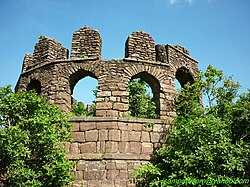Gurijala Dynasty | |||||||||||||
|---|---|---|---|---|---|---|---|---|---|---|---|---|---|
| 1325 A. D.–1433 A. D. | |||||||||||||
 Ramagiri Fort | |||||||||||||
| Capital | Ramagiri Fort | ||||||||||||
| Common languages | Telugu | ||||||||||||
| Religion | Hinduism | ||||||||||||
| Government | Monarchy | ||||||||||||
| Historical era | Medieval India | ||||||||||||
• Established | 1325 A. D. | ||||||||||||
• Disestablished | 1433 A. D. | ||||||||||||
| |||||||||||||
Gurijala Nayakas were a Kamma clan who ruled Ramagiri Fort as capital during 14th and 15th centuries. Most famous of this clan was king Gurijala Muppa Bhupathi. He patronised famous poet Madiki Singana. [1] [2]